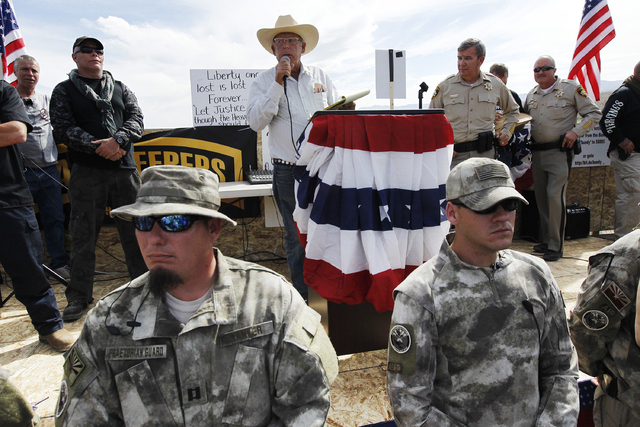Nevada U.S. attorney: Not sitting on Bundy cases

WASHINGTON — Nevada’s chief federal prosecutor said Tuesday a public interest group got it wrong when it said authorities were “sitting on” cases the Bureau of Land Management proposed for prosecution weeks after the agency’s standoff with Clark County rancher Cliven Bundy.
U.S. Attorney Daniel Bogden said the cases involved were not linked to Bundy but to the 2013 Burning Man festival in Northern Nevada. And, Bogden said, those cases were resolved and closed.
Bogden said his office “does not sit on criminal referrals from BLM,” and suggestions otherwise were based on faulty assumptions.
Public Employees for Environmental Responsibility (PEER), an organization of local, state and federal natural resource workers, said Tuesday an analysis of federal records turned up 35 criminal referrals the BLM sent to the Justice Department on April 30, three weeks after agents seeking to round up Bundy cattle about 80 miles northeast of Las Vegas were resisted by armed militia supporting the controversial rancher.
The complaints were five times the number of cases the BLM has ever filed in any one month, and exceeded the number of complaints filed by BLM during the rest of the fiscal year. The cases were listed as active and having neither been accepted nor declined for prosecution, according to data PEER cited from the Transactional Records Access Clearinghouse, a research group at Syracuse University.
PEER Executive Director Jeff Ruch referenced the data in the group’s latest call for the BLM to take action against Bundy and militia members who participated in the standoff. The roundup of cattle that a court found to be trespassing on federal rangeland was canceled on April 12 under threat of violence.
Clark County officials said in May the FBI was investigating whether federal laws were broken during the confrontation.
“A criminal referral is the toughest option available to a land management agency like BLM but that action is toothless if the U.S. attorney ignores it,” Ruch said. “BLM cannot do its job without legal support from the Justice Department.”
But Bogden spoke out following news reports tying the BLM criminal referrals to the Bundy case.
The requests for prosecution cited by PEER “have no connection to BLM’s plan to enforce a federal court order and the roundup of Cliven Bundy’s cattle that were unlawfully grazing on federally managed lands,” Bogden said.
Furthermore, his office explained, “There were 36 cases opened by the U.S. Attorney’s Office in Nevada on April 30, 2014, but they were citations issued at the 2013 Burning Man festival for things such as violating closure orders, driving with obstructed license plates, littering, possession of controlled substances, and creating a hazard or nuisance, all of which have been resolved and closed.”
Bogden said his office has not seen the TRAC databases that were the source of PEER’s information, “but we do not comment on reports by TRAC.”
Federal prosecutors in Nevada had a mixed record of pursuing public land cases in the 1990s. A PEER report in 2000 found the U.S. attorney office in the state ranked in the bottom quarter in terms of willingness to prosecute criminal complaints filed by the U.S. Forest Service between 1992 and 1998. The perceived lack of responsiveness was cited in the 1999 resignation of Gloria Flora, then-supervisor of the Humboldt-Toiyabe National Forest.
But between 1999 and 2013, the Justice Department prosecuted more than 90 percent of Nevada cases referred by the BLM and other Interior Department agencies in 13 out of 15 years, according to TRAC. The prosecution rate for the first seven months of fiscal 2014 was 89 percent.
In pressing for action against armed participants in the Bundy standoff, PEER argues the episode has fostered an atmosphere of tension in the West that endangers rangers, land agents and others who represent government.
An unclassified intelligence assessment issued in July by the Department of Homeland Security judged that the “perceived victory by militia extremists in a show of force” against the BLM at the Bundy ranch “will likely inspire additional anti-government violence over the next year.”
In a lawsuit in June, PEER charged the BLM was wrongfully withholding documents on the planning for the seizure of Bundy’s cattle that were deemed to be illegally grazing on federal lands. The confrontation was the latest front in a decade-long battle between Bundy and the government over grazing rights.
A Justice Department practice of withholding details of criminal complaints until they are resolved also has come under criticism.
David Burnham, co-director of the Transactional Records Access Clearinghouse program, said it is troubling but not unusual for the Justice Department to withhold details of prosecution referrals, including proposed lead charges and the category of crime committed. The practice is one element of a long-running legal battle between the department and the clearinghouse, he said.
Contact Stephens Washington Bureau Chief Steve Tetreault at stetreault@stephensmedia.com or 202-783-1760. Find him on Twitter: @STetreaultDC.